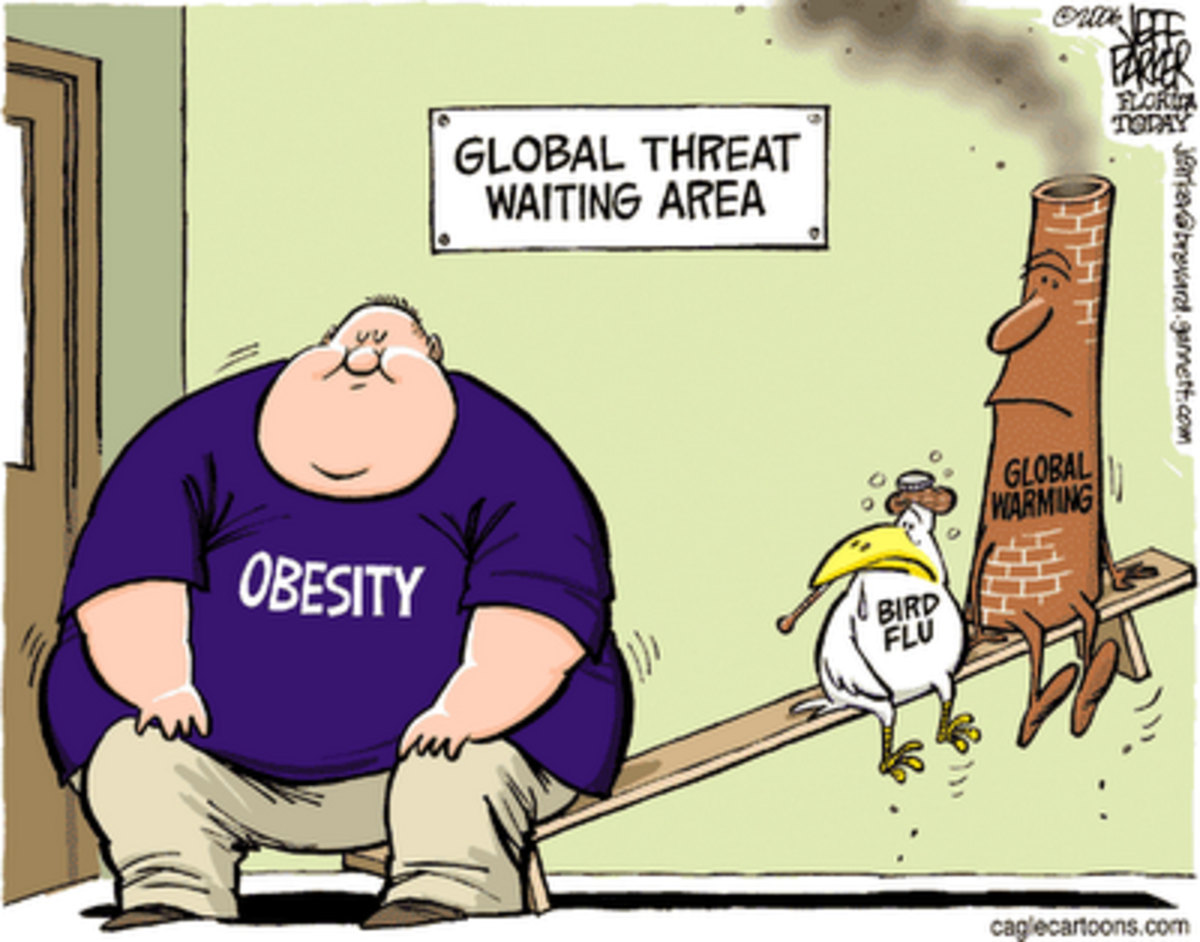Obesogens
Are fat people always at fault for their condition? If you eat right, exercise daily, and lead a balanced lifestyle, will this always be enough to keep you fit and trim? Is the obesity epidemic in the United States today entirely a matter of poor self-control, a combination of gluttony and sloth? Or are there other reasons for obesity besides overeating and underexercising?
Recently, I read an article in Newsweek about obesogens, substances that can disrupt the normal balance in our bodies and incline us toward obesity. What caught my attention was the statement that sometimes weight gain occurs in people who eat no more than others of comparable age and who exercise no less. In a group of babies under the age of six months, one can already detect serious differences in the way that body fat accumulates, even when they have a similar diet and the same exercise regimen.
Obese children are common in the United States

The term "obesogens" was coined by Bruce Blumberg of the University of California, Irvine. It refers to substances in the environment that might disrupt the metabolic process. What subtances are these? And is there any study that definitively links these substances with the obesity epidemic?
That's where the obesogen story strikes many of us as rather weak. "Exposure to environmental chemicals during development may be contributing to the obesity epidemic," Newsweek quotes Retha Newbold of the National Institute of Environmental Health
Sciences (NIEHS) in North Carolina, part of the National Institutes of
Health (NIH), as saying, But is there any evidence?
Newbold gave low doses of estrogen-like compounds to newborn mice. According to the Newsweek article: "In six
months, the mice were 20 percent heavier and had 36 percent more body
fat than unexposed mice." These weight gains occurred without allowing the obese mice access to more food than controls, and the obese mice were not any less active than the controls. They gained weight on the same diet and the same amount of exercise as their fellow mice who were not obese!
Newsweek quotes Newsbold as saying: "What was so odd was that the overweight mice were not eating more or moving less than the normal mice. We measured that very carefully, and there was no statistical difference."
What does this prove?
I got a little excited when I read about Newbold's experiment with the mice. But it wasn't because I was convinced that unnatural substances in our environment are the cause of the obesity epidemic. I think the experimenters are still a long way from proving that. It would take much more to link specific environmental chemicals to the weight gain in the general population -- and even in very young children.
The thing that excited me was the idea that there is more to weight gain than the simple arithmetic process of adding up the calories you eat and subtracting the calories you burn. I've always suspected that there was more to weight gain than budgeting calories.
Different Factors in Weight Gain
Even among newborns of comparable body length, some weigh considerably more than others. It's hard to say what exactly contributes to this discrepancy, because as we all know, unborn babies are not all receiving the same caloric input, and they are not all equally as active. Some kick and squirm a lot in utero, and others are so inactive that they cause concern even before they are born.
After birth, parents are even more aware of the baby's activity level. Some babies, even when lying flat on their back, fidget and squirm a great deal more than others, and it is quite likely that more active babies burn more calories. Noting a tendency toward obesity in those under six months of age does not necessarily correlate with environmental disruptors.
But the experiment with the mice showed something important: there is more to weight gain than the calories we burn and the calories we consume.
Obesity in Children
The Savings/Spending Metaphor
We can use an economic metaphor to explore the different factors that go into a person's weight gain or loss. Think of calories consumed as the person's income. Think of money spent as calories burned. The traditional take on weight management is that if you want to put on weight, you should increase savings, by reducing spending or increasing income. (That is, exercising less or eating more.) If you want to lose weight, you should save less, by spending more or reducing your income. (That is, exercising more and eating less.)
In this metaphor, body fat is savings. Just as many people think that wealthy people are bad, so there are many among us who pass judgment on the obese for being fat. But we all know, don't we, that there's much more to how much you save than what your income is and how much of it you spend?
Consider Tom and Harry, two co-workers who earn the same salary, live in houses that are equal in valuation and drive exactly the same car. Let's say they also spend the same on groceries and entertainment and the like. In short, their income and their spending are exactly the same. Does this guarantee that their savings will be the same? No, it does not.
What if Tom keeps all his extra money in CDs and high yield money market accounts, and Harry keeps his extra money in the mattress? What if Tom always pays with exact change in the supermarket, while Harry pays with full dollar bills and then tosses the change haphazardly on the counter, or under the bed, or into the sofa? What if Tom uses tax shelters and loopholes to shield his income from marauders and Harry does not? What if Tom pays cash for major purchases and Harry uses credit? At the end of the year, who will have more savings?
Efficiency in managing our resources can be a factor. This is true when it comes to money. It is no less true when it comes to calories. Some people are fat because they overeat. Some people are fat because they don't exercise enough. And some people are fat because their bodies are unusually efficient in storing fat!
If the body has more fat cells, it can store fat more efficiently
In 2006, according to the Newsweek article on obesogens, Bruce Blumberg fed pregnant mice tributyltin, a disinfectant and fungicide which enters the human food chain in seafood and drinking water. "The offspring were born with more fat already stored, more fat cells, and became 5 to 20 percent fatter by adulthood," Blumberg told Newsweek.
How did this happen? Apparently, the tributylin activated a receptor site called "PPAR gamma" which switches embryonic cells from being fiborblasts to becoming fat cells. When a baby mouse is born with more fat cells, apparently it is able to store more fat after consuming the same number of calories than another baby mouse that was born with fewer fat cells. Because there is better storage for fat, the accumulation of fat proceeds more efficiently, and fewer calories are frittered away. If this works for baby mice, it might very well be true of human babies as well.
Diversity and Tolerance
Are there human children who are born with more fat cells? And if so, is this due to obesogens in the environment? It may be too early to decide. But one thing seems to be proven already: efficiency in processing calories is a factor in weight gain.
It's not necessarily the case that all congenital tendencies toward obesity involve a higher number of fat cells in the embryo. Efficiency in processing calories may also involve the basic metabolic rate of each individual. Some people burn more calories even while at rest than do others. Inefficiency in regulating body temperature may be a factor for some people. It's like two households that keep their thermostat set to the same temperature, but one has a house with faulty insulation. How much they are able to save can be affected by an energy leak.
In an affluent society such as ours, bodies that are too efficient in processing caloric resources may be less desirable. It's easy to put on weight, so the laws of supply and demand make a skinny body more sought after. In the U.S. today, healthier and wealthier people have bodies that don't process energy so efficiently as to put on much fat. However, the tables could easily be reversed, and an economic collapse may lead to a situation where greater efficiency is more desirable again, as it was with our ancestors in past generations. Under those conditions, fat people might suddenly find themselves healthier, wealthier and more popular.
For those people who put on more weight than others for the same number of calories consumed, without exercising less, one way to avoid obesity might be to decrease the efficiency with which calories are processed. One way to do this is to choose a diet low in carbs. Since carbs are easier for the body to process into energy, consuming calories that are not in the form of carbs may lead to storage of less fat. That is, if you want to store less fat.
But let's face it, in a famine, those with more body fat are more likely to survive, and those whose efficiency in fat storage is high will have an advantage. So before we decide that efficiency in saving calories is always a bad thing, we should consider all possible environments.
In an inflationary economy, people burdened with wealth suffer, and it is wise not to accumulate savings. In a deflationary economy, those with savings may prosper. Before you condemn someone who has savings for greed or avarice, consider that he may not have had more income than you or spent any less. He may simply be more efficient at processing the income he has.
By the same token, when you meet someone with more body fat than you have, don't assume he got that way by gluttony or sloth. He may simply be more efficient at processing calories than you are. In a famine, that skill will come in handy!
It takes a diverse population to ensure human survival. You never know when the environment may favor a different body type than the one that is currently popular. Before we pass judgment on others for the way they are, maybe it would be good to consider all the possible benefits of each person's assets. There is more than one way to be!
(c) 2009 Aya Katz
Books by Aya Katz
Related Hubs
- http://hubpages.com/hub/Can-a-Virus-Make-You-Fat-The-Facts-about-Adeno-virus-36
- Childhood Obesity Statistics
According to the Centers for Disease Control and Prevention, 16 percent of children (over 9 million) 6-19 years old are overweight or obese -- a number that has tripled since 1980. In addition to the 16... - Obesity epidemic : the ten countries with the fattest people
I got out my calculator, did a little extra research, and here they are! The top ten countries for obesity. I must admit, I was prejudiced. I expected the USA to top the list, and I was absolutely wrong. I also thought England would thud heavily towa - I am not weak willed!
So often people look at fat people and think: ohhh! that person has such little will, cant they just push themselves away for the table, eat a little less, exercise a little more. How could they...
- Japanese scientists discover genes that enable type-2 diabetes
Wednesday, August 6, 2008 -- Japanese researchers at dozens of universities and medical research labs have announced today the discovery today of several previously unknown genes that make humans susceptible...










